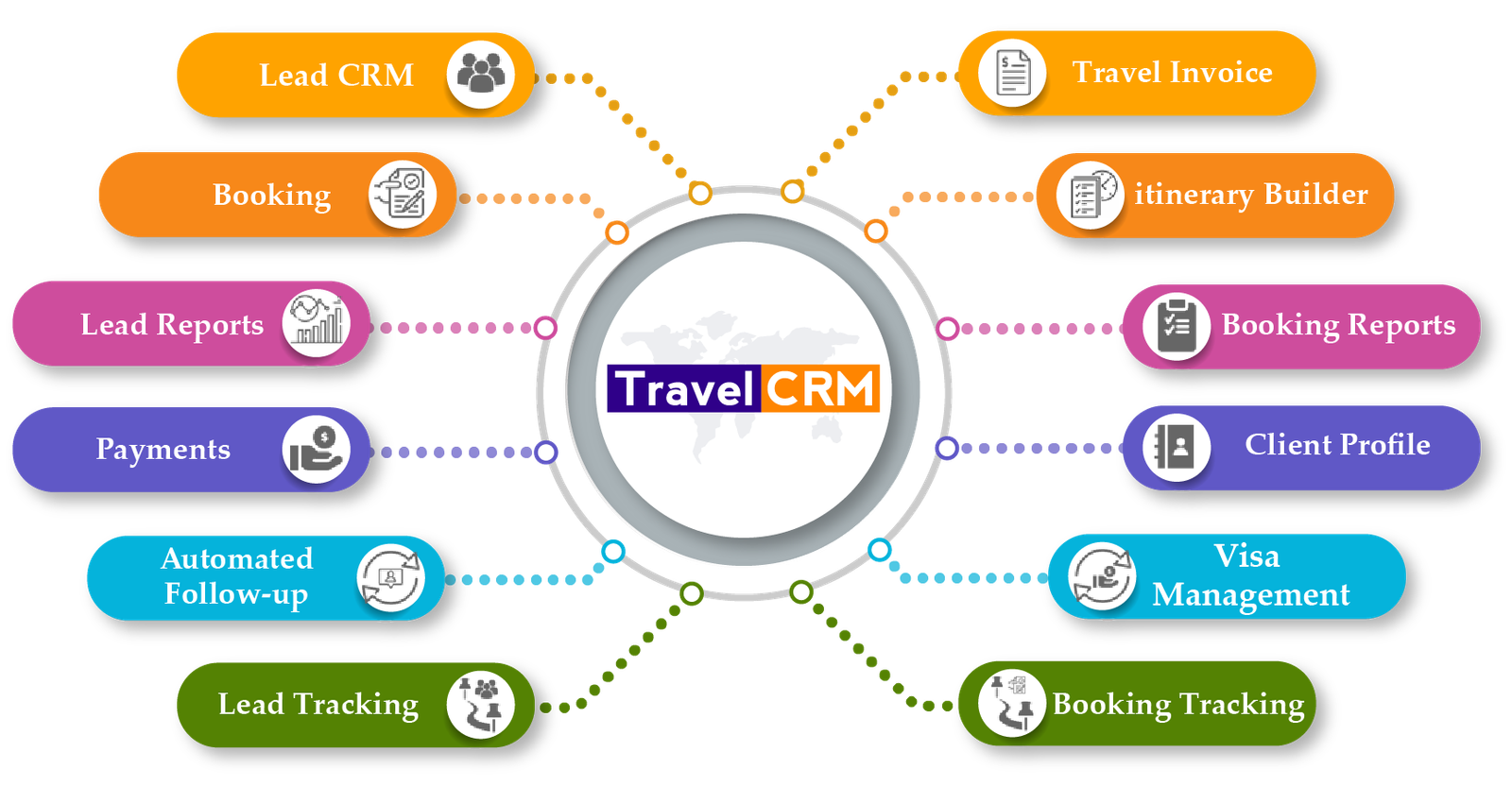
best travel crm
Today, in the competitive business of travelling, proper usage and satisfaction of customers are long ways to ensure success in business. Travel agencies have started opting for Customer Relationship Management (CRM) systems to make their operations efficient, improve client connectivity, and establish better relations with clients. The right CRM software helps in automating all daily tasks, enabling proper management of customer data, and overall improvement in business performance.
Here’s how you can use CRM to streamline your travel business:
1. Centralised Client Data Management
One of the key advantages of a CRM system is that it centralises all customer data. The travel agency often has significant client diversity in every possible means, such as by destination, budget, the nature of accommodation, and many further parameters. Working with all this information in paper files or spread across several systems is extremely messy and error-prone.
A CRM enables you to keep all client information at one place. This saves you time while accessing your clients’ favourite destinations, travel history, or any other information from them, thus providing them with the personalised service they need. From recommending a destination based on the client’s past travels to working out a package that fits within your client’s budget, CRM systems ensure that all the repetitive tasks become automated, minimising the workload in proving quality and satisfaction to clients.
2. Automating Repetitive Tasks
Travel agents usually deal with a number of daily tasks-including booking confirmations, sending itineraries, and having to remind clients about follow-throughs. If done manually, all these tasks consume so much time. Using CRM software can automate such routine processes. For instance, by creating automatic e-mail triggers for the time bookings get confirmed or reminders for a follow-up are due, you never miss any task.
Automation frees up much time for other things like providing good customer services and getting to know your clients. Administrative work can be pretty routine, and hence, the CRM should always take this up, freeing time for more important tasks such as designing special itineraries, working on high-value clients, and so on.
3. Improving Client Contact
The communication in the travel industry is crystal clear and timely. Clients expect prompt answers and up-to-date information on their bookings, queries, and changes made to their travel plans. The CRM system, therefore, allows a travel agent to track down every interaction with a customer.
Using email marketing tools and templates, you can easily send promoting offers, discount offers, or last-minute options to deal with your clients. The majority of CRM systems accompany other communication channels such as WhatsApp, SMS, and social media, which will help a person remain in touch with the clients on all levels of the possible networks that interact. This leads to stronger, more long-term client engagement.
4. Personalised Travel Experiences
Travellers today want personalisation. CRM helps travel agencies to render a kind of solution tailored to the needs of an individual client. For example, by tracking the history of travel for that particular client, his preference, and special requirements, you can easily generate custom packages and travel itineraries to suit his needs.
For instance, if one of the clients often travels to enjoy adventure, you can sell them only designated deals in hiking or skiing packages. In this way, travel agencies offering services tailored to clients’ needs will more than likely be able to satisfy their customers and book them again; CRM systems enable you to gather all the data you need to create such personalised experiences, allowing your business to be more competitive with other players in the market for travel.
5. Enhancement of Customer Support
It would be much easier to maintain a tracking record for a customer if he contacts your travel agency with a query or complaint. All this information available in the CRM is fed into the system by the agents dealing with that client’s bookings, preferences, and past interactions. So, while a client contacts the agency with any kind of query or complaint, the CRM system provides the agents with all the information about that client’s bookings, preferences, and past interactions, which aid them in hastening the support they offer.
It is actually a means of improving customer satisfaction through offering very quick and effective solutions in response to queries from clients. Clients love companies that give fast, reliable support that will come back to your agency in future travel needs.
6. Improved Team Collaboration
Travel agencies may function through teams representing different areas of the business, such as the booking and customer-service and marketing teams. The effectiveness of a CRM comes in with regard to team collaboration, because members can access information that is real-time, anywhere in the company, ensuring everyone is up to date and working efficiently towards a single goal.
For example, the sales team will know who is the lead from the marketing team and can follow up with an appropriate travel package. During the same process, the customer support will be accessing the same client data to answer all post-booking queries. When this happens, cross-functional teams are bound to work in harmony when there is CRM-Reduction of errors and smoother workflows.
7. Efficient Lead Management
For example, managing leads well is a very crucial input for maximising your client base in a travel business. A CRM helps capture leads and organise them to nurture leads in the best manner possible. Lead is bifurcated into areas like interest level, source, and demographic to concentrate on high-potential prospects.
Lead scoring tools are used in CRM systems in such a way that it help in prioritising follow-ups so that agents focus on the most valuable opportunities. Therefore, there is more chance of conversion for those deals and they get closed faster by the agents.
Automated follow-up reminders ensure leads do not slip through the cracks and thus, enhance every opportunity.
8. Data-Driven Insights for Better Decision Making
Generally, CRM solutions deliver an array of reporting tools that allow travel agencies to penetrate further into the very core of the business they are conducting. Everything – sales to performance or investigations of customers’ behavior – data from CRM can be used to generate reports for making informed decisions.
This means you can track which of your marketing campaigns will give you the most leads. You can even tell that which travel packages are in high demand. In this way, you may change the things you offer to have a better chance of selling them and marketing efforts in general. The appeal of CRM analytics lies in the ability to detect trends and direct decisions with data regarding business expansion.
9. Seamless Integration with Other Tools
Many CRM systems have integrations into other tools that are crucial for the travel industry, such as booking platforms, accounting software, and marketing automation tools. In this way, there is a smooth flow of information between different systems; it reduces unwanted keys inputs and inaccuracies errors.
For example, if you integrate your CRM with your booking system, then the client’s reservations would update automatically within your CRM. This saves time and prevents data entry errors, greatly helping in streamlining the processes while making it easy, efficient, and more productive for your agency.
Conclusion
CRM systems are today a vital component of a travel agency that can help a company standardise its business process, enhance the relationship with its clients, and boost the productivity of the entire organisation. A centralised system of data on clients, automation of routine practices, improvement in communication, and services designed according to the preferences of clients-all this can turn the way you manage your travel business upside down. Right CRM will help increase the efficiency level, the level of services to the clients, and will ultimately lead to more sales and revenue for the agency.
One of the strategic step-by-step steps to victory in this industry is by investing in a strong CRM system appropriate for your travel agency’s needs.






